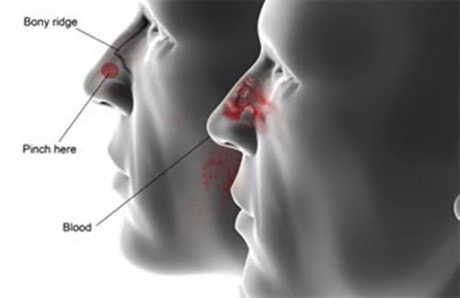12 causes of nosebleeds
Nosebleeds are a phenomenon that almost everyone experiences in their life. There are many causes of nosebleeds, both local and systemic.
 |
Allergic rhinitis:As a result of the body's allergic reaction, the tissues lining the nose swell. The capillaries dilate and sometimes burst, causing nosebleeds. Blood may ooze out in small streaks whenever you blow your nose or sneeze.
 |
Frequent sneezing: Frequent sneezing can also cause ulcers in the lining of the septum (the central partition between the two nostrils) and this can easily lead to bleeding.
 |
Dry climate: This is common in patients with a deviated septum because the airflow when “passing” through a narrow area in the nose will be faster and make the nose drier, causing irritation, followed by sneezing and nosebleeds.
 |
Nose picking:Picking your nose is a seemingly harmless activity, but in reality it can cause hair loss, damage the mucous membranes, rupture blood vessels and cause bleeding. In addition, frequent nose picking can easily cause nasal infections.
 |
Sinus infection or tumor:In adults, nosebleeds that are dark in color or have a foul odor may be a sign of a sinus infection or a tumor in the nose. If this is the case, the patient should be examined by endoscopy and CT scan.
 |
Blood diseases:Nosebleeds are a common symptom and require blood tests and treatment at a hematology specialist.
 |
Physiological changes:Physiological changes that lead to nosebleeds are common in pregnant women, especially those with high blood pressure during pregnancy. In this case, pregnant women need to see an obstetrician for active monitoring and treatment.
 |
When lacking vitamin C:The skin will be dry, prone to subcutaneous bleeding (skin easily bruised by light impact), nosebleeds, bleeding gums, slow wound healing. Therefore, when suddenly having a nosebleed, it can signal that the body is in dire need of additional vitamin C.
 |
Hypertension:High blood pressure is a common cause of nosebleeds in the elderly. When blood pressure increases, it leads to increased pressure on the blood vessel walls, which can rupture the blood vessel walls, leading to dangerous complications such as nosebleeds, cerebral hemorrhages, fundal hemorrhages...
 |
Exudatesis often secreted when the nose is inflamed, sticking to the mucous membrane, making you feel itchy and uncomfortable. This leads to you picking your nose frequently, causing bleeding.
 |
Nasopharyngeal fibroma:This is a common disease when children reach puberty. It will be accompanied by signs such as nosebleeds, nasal congestion, tinnitus and hearing loss. If not treated promptly, the tumor can rupture, causing massive bleeding and the patient can die from blood loss.
 |
Allergy:Usually when you have an allergy, your body reacts by causing the tissues to swell. When the tissues along your nose swell, the capillaries dilate. If they stretch too much, they can burst, causing bleeding when you sneeze or blow your nose.
 |
The cause of frequent nosebleeds is a very dangerous symptom. Therefore, if you often have nosebleeds, you need to go to a medical facility to be examined and do the necessary tests to find the cause and treat the disease promptly.
According to VOV
| RELATED NEWS |
|---|
